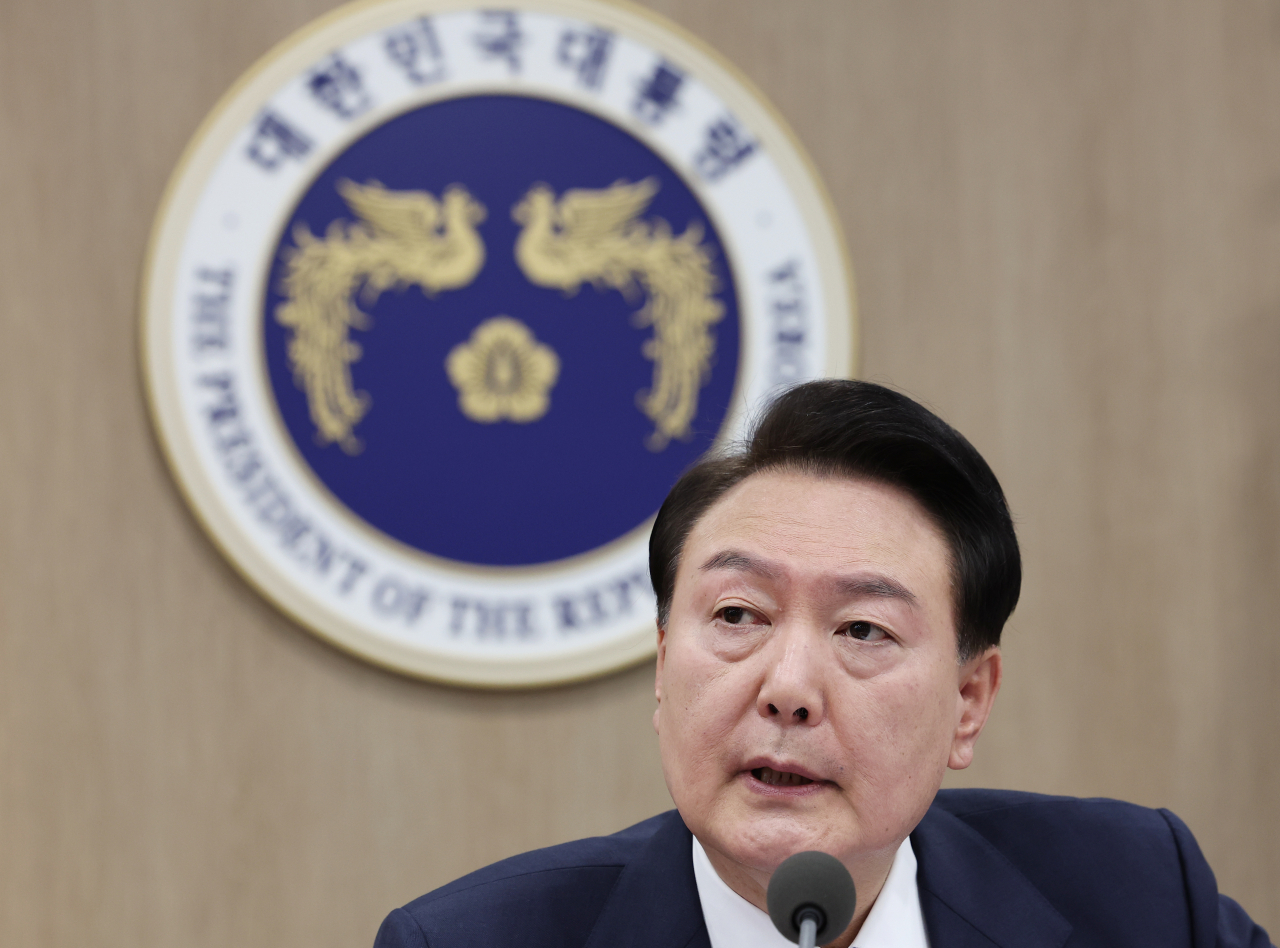 |
President Yoon Suk Yeol speaks during a Cabinet meeting at his office in Seoul, Tuesday. (Yonhap) |
President Yoon Suk Yeol on Tuesday ordered the Cabinet to look into possibilities of a cyberattack on public digital infrastructure amid a series of administrative network breakdowns that caused inconveniences to the public in the past week.
According to Yoon at a Cabinet meeting held in his office in Seoul, the presidential National Security Office has launched a pangovernmental investigation to inspect any potential vulnerabilities in South Korea's administrative networks, adding the lack of cybersecurity measures countering the North Korean regime might have opened the way for the malfunction.
"We should keep an eye on the possibilities of an external cyberattack against the public infrastructure system," Yoon said.
At least four instances of government network outages occurred since Nov. 17, garnering media attention.
This apparently tarnished South Korea's reputation as one of the world's leaders in digital government prowess. South Korea, along with Denmark and Finland, were the highest scorers in the 2022 digital government ranking of the 193 United Nations member states, when it comes to the scope and quality of online services, the status of telecommunications infrastructure and human capacity.
On Nov. 17, a civil service portal for local governments was rendered inoperative throughout office hours, causing inconvenience to those who went to community service centers to get certificates or other civil administrative documents issued. The portal resumed its operation at full capacity on Nov. 20 as the government struggled to identify the cause of the error over the weekend.
The incident was preceded by a breakdown of a resident registration system for 20 minutes on Wednesday, an outage of the electronic procurement system called Narajangteo for an hour on Thursday and a seven-hour breakdown of the mobile identification card app and its website on Friday.
The malfunctions triggered criticism toward the Yoon administration. The main opposition Democratic Party of Korea's Chairman Rep. Lee Jae-myung on Monday urged Yoon to sack Interior Minister Lee Sang-min, saying a top government official in charge of the public electronic infrastructure management must face consequences.
Yoon on Tuesday called on the government to tackle the fundamental problem, as the glitches, big and small, in public digital services have been nothing new over the past few years.
"We must carry out a keen analysis to discover whether the recent technical breakdowns are attributable to a problem in system management, or to customary practices with regard to public infrastructure procurement projects such as an excessive decomposition of tasks for outsourcing and frequent change in vendors in charge of the system management," Yoon said in a speech.
"Identifying the cause (of the breakdowns) is the first step to preventing any further disruptions in the future. Cybersecurity measures must be enhanced if (the infrastructure) was left susceptible to cyberattacks, and policy improvements must be made if we identified a glitch in our own management and response system."
Yoon's remarks contrasted with the Interior Ministry's announcement on Saturday that no trace of external hacking attempts was found in its investigation, while attributing the breakdown on Nov. 17 to a router glitch.
Meanwhile, Yoon also vowed to impose heavier sanctions on employers who delay workers' salaries, adding that some 220,000 employees had suffered a combined 1.4 trillion won ($1.08 billion) of salary delays. Yoon also hinted at easing regulations with regard to employees' government loans for salary payments.
Moreover, Yoon revealed during the meeting on Tuesday that he had met over 150 heads of state to ask for support for South Korea's port city Busan's bid to host the World Expo in 2030, before the voting of the World Expo organizing body Bureau International des Expositions took place on Tuesday.
"(The government) has pushed for the Busan World Expo bid to achieve balanced development (of Seoul and regions outside Seoul) and the exponential growth of the nation," Yoon said.






![[Today’s K-pop] Blackpink’s Jennie, Lisa invited to Coachella as solo acts](http://res.heraldm.com/phpwas/restmb_idxmake.php?idx=644&simg=/content/image/2024/11/21/20241121050099_0.jpg)
